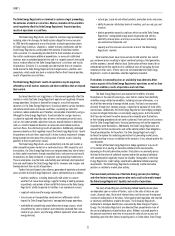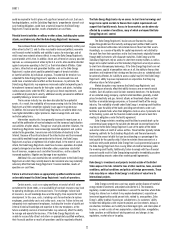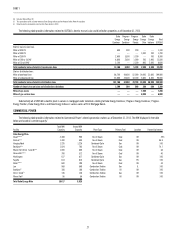Duke Energy 2012 Annual Report Download - page 43
Download and view the complete annual report
Please find page 43 of the 2012 Duke Energy annual report below. You can navigate through the pages in the report by either clicking on the pages listed below, or by using the keyword search tool below to find specific information within the annual report.
PART I
23
Duke Energy’s investments and projects located outside of the United
States expose it to risks related to fl uctuations in currency rates. These
risks, and Duke Energy’s activities to mitigate such risks, may adversely
affect its cash fl ows and results of operations.
Duke Energy’s operations and investments outside the U.S. expose it
to risks related to fl uctuations in currency rates. As each local currency’s
value changes relative to the U.S. dollar — Duke Energy’s principal reporting
currency — the value in U.S. dollars of Duke Energy’s assets and liabilities
in such locality and the cash fl ows generated in such locality, expressed in
U.S. dollars, also change. Duke Energy’s primary foreign currency rate exposure
is to the Brazilian Real.
Duke Energy selectively mitigates some risks associated with foreign
currency fl uctuations by, among other things, indexing contracts to the U.S. dollar
and/or local infl ation rates, hedging through debt denominated or issued in the
foreign currency and hedging through foreign currency derivatives. These efforts,
however, may not be effective and, in some cases, may expose Duke Energy to
other risks that could negatively affect its cash fl ows and results of operations.
Duke Energy’s merger with Progress Energy may not achieve its
intended results.
The merger is expected to result in various benefi ts, including, among other
things, cost savings and operating effi ciencies relating to the joint dispatch of
generation and combining of fuel purchasing power. Achieving the anticipated
benefi ts of the merger is subject to a number of uncertainties, including market
conditions, risks related to Duke Energy’s businesses, and whether the business
of Progress Energy is integrated in an effi cient and effective manner. Failure to
achieve these anticipated benefi ts could result in increased costs; decreases
in the amount of expected revenues generated by the combined company and
diversion of management’s time and energy and could have an adverse effect on
the combined company’s fi nancial position, results of operations or cash fl ows.
Duke Energy’s and Progress Energy’s ability to fully utilize tax credits may
be limited.
In accordance with the provisions of Internal Revenue Code
Section 29/45K, Duke Energy and Progress Energy have generated tax credits
based on the content and quantity of coal-based solid synthetic fuels produced
and sold to unrelated parties. This tax credit program expired at the end of
2007. The timing of the utilization of the tax credits is dependent upon Duke
Energy’s and Progress Energy’s taxable income. The timing of the utilization can
also be impacted by certain substantial changes in ownership, including the
merger of Duke Energy and Progress Energy. Additionally, in the normal course
of business, Duke Energy’s and Progress Energy’s tax returns are audited by
the IRS. If Duke Energy’s and Progress Energy’s tax credits were disallowed in
whole or in part as a result of an IRS audit, there could be signifi cant additional
tax liabilities and associated interest for previously recognized tax credits,
which could have a material adverse impact on Duke Energy’s and Progress
Energy’s earnings and cash fl ows. Although Duke Energy and Progress Energy
are unaware of any currently proposed legislation or new IRS regulations or
interpretations impacting previously recorded synthetic fuels tax credits, the
value of credits generated could be unfavorably impacted by such legislation or
IRS regulations and interpretations.
Duke Energy Carolinas, Progress Energy Carolinas and Progress Energy
Florida may incur substantial costs and liabilities due to their ownership
and operation of nuclear generating facilities.
Ownership interest in and operation of nuclear stations by Duke Energy
Carolinas, Progress Energy Carolinas and Progress Energy Florida subject them
to various risks. These risks include, among other things: the potential harmful
effects on the environment and human health resulting from the operation
of nuclear facilities and the storage, handling and disposal of radioactive
materials; limitations on the amounts and types of insurance commercially
available to cover losses that might arise in connection with nuclear operations;
and uncertainties with respect to the technological and fi nancial aspects of
decommissioning nuclear plants at the end of their licensed lives.
Ownership and operation of nuclear generation facilities requires
compliance with licensing and safety-related requirements imposed by the NRC.
In the event of non-compliance, the NRC may increase regulatory oversight,
impose fi nes, and/or shut down a unit, depending upon its assessment of the
severity of the situation. Revised security and safety requirements promulgated
by the NRC, which could be prompted by, among other things, events within
or outside of Duke Energy Carolinas’, Progress Energy Carolinas’ and Progress
Energy Florida’s control, such as a serious nuclear incident at a facility owned
by a third party, could necessitate substantial capital and other expenditures, as
well as assessments to cover third-party losses. In addition, if a serious nuclear
incident were to occur, it could have a material adverse effect on Duke Energy
Carolinas’, Progress Energy Carolinas’ and Progress Energy Florida’s results of
operations and fi nancial condition.
Ownership and operation of nuclear generation facilities also requires the
maintenance of funded trusts that are intended to pay for the decommissioning
costs of the respective nuclear power plants. As discussed below, poor
investment performance of these decommissioning trusts’ holdings and other
factors impacting decommissioning costs could unfavorably impact Duke Energy
Carolinas’, Progress Energy Carolinas’ and Progress Energy Florida’s liquidity
and results of operations as they could be required to signifi cantly increase their
cash contributions to the decommissioning trusts.
Market performance and other changes may decrease the value of Duke
Energy Carolinas’, Progress Energy Carolinas’ and Progress Energy
Florida’s Nuclear Decommissioning Trust Fund (NDTF) investments, which
then could require signifi cant additional funding.
The performance of the capital markets affects the values of the assets
held in trust to satisfy future obligations to decommission nuclear plants. Duke
Energy Carolinas, Progress Energy Carolinas and Progress Energy Florida have
signifi cant obligations in this area and hold signifi cant assets in these trusts.
These assets are subject to market fl uctuations and will yield uncertain returns,
which may fall below projected rates of return. Although a number of factors
impact funding requirements, a decline in the market value of the assets may
increase the funding requirements of the obligations for decommissioning
nuclear plants. If Duke Energy Carolinas, Progress Energy Carolinas and
Progress Energy Florida are unable to successfully manage the NDTF assets,
their fi nancial condition, results of operations and cash fl ows could be
negatively affected.
The costs of retiring Progress Energy Florida’s Crystal River Unit 3 could
prove to be more extensive than is currently identifi ed. All costs associated
with retirement of the Crystal River Unit 3 asset, including replacement
power, may not be fully recoverable through the regulatory process.
Early retirement could result in continued purchases of replacement power
and/or additional capital and operating costs associated with construction of
replacement capacity resources to continue to service Progress Energy Florida’s
customer needs. However, there is no defi nitive plan for new generating
capacity at this time. In addition, exit costs to wind down operations and
ultimately to retire and decommission the plant could exceed estimates and,
if not recoverable through the regulatory process, could adversely affect Duke
Energy’s, Progress Energy’s and Progress Energy Florida’s fi nancial condition,
results of operations and cash fl ows.
While the foregoing refl ects Progress Energy Florida’s current intentions
and estimates with respect to the retirement of Crystal River Unit 3, the cost
























